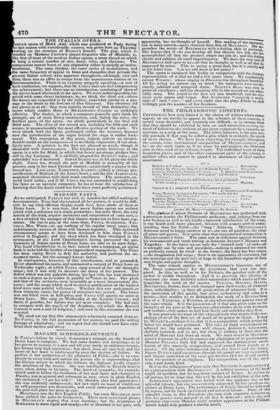THE ITALIAN OPERA.
,ogra's opera of Maids Adel, which was produced at Paris during e last season with considerable success, was given here on Thursday vening, on the occasion of RUBINT'S benefit. The plot, which is ounded on Madame COTTIN'S almost forgotten tale of MathiIde, is, ike that of most of the modern Italian operas, a mere thread on which o hang a certain number of airs, duets, trios, and choruses. The omposition cannot boast of any originality either in melody or instru- mentation. The same rhythm, the same series of modulations, and the same frequency of appeal to brass and sheepskin that pervade the present Italian school, were apparent throughout—although, now and then, there was an effort to escape from the monotonous routine of its "nstrumentation. There is no overture properly speaking,—a sort of tacit confession, we suppose, that M. COSTA does not feel competent to the achievement ; but there was an introduction, consisting of three of the pieces beard afterwards in the opera. We were rather agreeably sur- prised with some clever imitations, in, we think, the third act—where the basses are responded to by the violins, somewhat similar to a pas- sage in the finale to the first act of Don Giovanni. The choruses did not please us at all they were entirely devoid of that distinctive cha- racter which renders those in METERBEER'S Crociato SO strikingly effective. The finales, in which a composer generally puts forth his strength, are of most flimsy construction, and, bating the noise, the feeblest parts of the opera : we allude particularly to the first and third acts. The close of the second act, including the fifth and sixth scenes, is unquestionably the most effective portion of the work. We were struck with the hymn performed within the convent, because now the introduction of the organ behind the stage is rather hack- neyed. The conception of this scene, indeed, reflects no inconsi- derable credit on the composer—it is decidedly impressive, if not abso- lutely new. A quintett in the first act pleased us much, though it abounded with reminiscences. 'Pile brightest point, however, in the opera, is a solo for Malek, in which thut heroic personage pledges him- self to slay Lusignan. It is skilfully adapted for RUBINI'S voice ; and splendidly was it delivered. Indeed RUBIN' was in his glory the whole night. GRIST too, though the part of Mathilde is unwoithy of her powers, sang in her most finished manner—particularly a prayer in the second act. LABLACHE, TASIBURINI, IVANOFF, (albeit El strange per- sonification of Richard of the Lion's heart,) and the fair Asnaurazzr, acquitted themselves with their usual excellence. The orchestra ex- erted itself nobly; and if M. COSTA has not succeeded in establishing his fame as an operatic composer, he has at least the satisfaction of knowing that his music could not have been more perfectly performed.


























 Previous page
Previous page